
Guests
- Mouin RabbaniDutch Palestinian Middle East analyst, co-editor of Jadaliyya and host of the Connections podcast.
Dutch Palestinian analyst Mouin Rabbani discusses the violence that broke out last week between visiting Israeli soccer fans and pro-Palestinian protesters in Amsterdam. The Dutch authorities made over 60 arrests, and at least five people were hospitalized as a result of the clashes, which local and international leaders were quick to brand as antisemitic, even though observers in Amsterdam have said it was Israeli hooligans who instigated much of the violence. Rabbani says that while it’s common for rival teams’ fans to get into skirmishes, what happened in Amsterdam was different. “What we’re talking about here in Amsterdam is not a clash between the hooligans of two opposing sides, but rather these Israeli thugs attacking people who, in principle, had nothing to do with the game, and then afterwards being confronted by their victims,” Rabbani says.
Transcript
AMY GOODMAN: I wanted to ask you about where you are right now. You’re at The Hague, Mouin Rabbani. But I want to ask you about the latest news nearby, in Amsterdam, where police beat and arrested more than a hundred pro-Palestinian protesters on Sunday after they defied a ban on demonstrations following street clashes between visiting Israeli soccer fans, many of them violent, and Dutch youth.
Unrest in the city began on Wednesday, when fans of the Maccabi Tel Aviv football team were seen chanting such slogans — and I want to get those slogans right, but I’ll be careful in what I say — “Let the IDF win, and F— the Arabs,” but of course they say “F—,” referring to the Israeli army’s offensive in Gaza. Another video captured a fans screaming “F— you, terrorists! Sinwar, die! Everybody, die!” in reference to the Hamas leader who was assassinated last month.
Amsterdam’s mayor blamed, quote, “antisemitic hit-and-run squads,” but many observers in Amsterdam said the Israeli fans were responsible for instigating the violence, the Israeli soccer fans known as hooligans. The violence grew into an international story as Israel sent planes to evacuate the Israeli fans.
On Sunday, the Israeli journalist Gideon Levy wrote a piece for the newspaper Haaretz in Israel headlined “The Amsterdam Attack Shows Israelis’ Denial of the Reality They Created.” In it, Gideon Levy writes, quote, “Why do they hate us so much? No, it’s not because we are Jews. Not that there isn’t antisemitism: Of course there is, and it must be fought, but the attempt to pin everything on it is ridiculous and mendacious. … The North African immigrants, the Arabs and the Dutch people who rioted saw the horrors in Gaza over the past year. They are not willing to remain silent about them. … This is another cost of the war in Gaza that should have been considered: The world will hate us for it. Every Israeli abroad will be a target for hatred and violence from now on. That’s what happens when you kill almost 20,000 children, carry out ethnic cleansing and destroy the Gaza Strip. It’s a little quirk of the world; it doesn’t like those who commit these sorts of crimes.” Again, those are the words of the Israeli journalist Gideon Levy in a piece for Haaretz.
Mouin Rabbani, can you talk about what happened?
MOUIN RABBANI: Yes. Well, just to pick up where you left off, in fact, their favorite slogans were “Death to the Arabs! May your village burn!” and “There is no school in Gaza because all the children are dead.” But it wasn’t just about racist and genocidal slogans. These Israeli soccer hooligans, thugs, if you will, also engaged in property destruction, assaulting people of Arab appearance, assaulting taxis and totaling one of them.
And more importantly, they were allowed to do all this under police protection. If you compare it to British football, for example, when British teams play abroad, the British government sends police details with them, not to protect the hooligans, but to restrain them and ensure that they’re unable to do any damage. And so, what we’re talking about here in Amsterdam is not a clash between the hooligans of two opposing sides, but rather these Israeli thugs attacking people who, in principle, had nothing to do with the game, and then afterwards being confronted by their victims, also with some violence included.
And then you had kind of a power struggle within the Dutch elites. Geert Wilders, the far-right, effectively, the ruler of the Netherlands, seeking to undermine the government and prime minister he appointed in order to increase his power over them, that government seeking to retain its fiefdom, if you will, his coalition partners seeking to maintain their power. So they all began kind of outbidding each other in demonizing their own citizens and calling these clashes an antisemitic Jew hunt, which would only make sense if one could demonstrate that the victims of these clashes were not just supporters of the Israeli team or Israelis more generally, but also Dutch Jews and Dutch Jewish institutions and Dutch Jewish properties. And there’s no evidence that such attacks took place or even that the Dutch Jewish community, which of course would have been understandably fearful, given all these reports they were receiving about Jew hunt and antisemitic pogrom and so on — there’s no evidence that they even asked for police protection on the night in question. And so, you know, the government, Wilders, the mayor of Amsterdam have all been going to increasing extremes of trying to compare what happened to the Nazi occupation, the German occupation of the Netherlands during the 1940s. The result —
AMY GOODMAN: Let me play, Mouin, for you what the Israeli Prime Minister Netanyahu said. He’s spoken with U.S. President-elect Donald Trump three times in the past few days, also commenting on what happened in Amsterdam on Thursday night.
PRIME MINISTER BENJAMIN NETANYAHU: [translated] Yesterday we marked the Kristallnacht that happened 86 years ago on European soil. It was a brutal and violent attack against Jews just because they were Jews. Unfortunately, in the last few days, we saw pictures that recall that night. In the streets of Amsterdam, antisemitic rioters attacked Jews, Israeli citizens, just because they were Jews. But there’s one big difference between that night and our time: Today we have a state.
AMY GOODMAN: Your response to the Israeli prime minister, Mouin Rabbani?
MOUIN RABBANI: Well, the key difference, of course, between Kristallnacht in November 1938 and what we saw in Amsterdam on the 7th of November is that the properties that were marked for assault and attack were targeted because they were, for example, displaying Palestinian flags, not menorahs. So, that’s kind of a key difference.
And, you know, all this talk about that these people were singled out because they were Jews, rather than because they were football supporters or presumed to be supporters of this racist, genocidal gang of soccer hooligans, is really just, you know, trying once again to make the point that the real victims here are not the children who are being slaughtered in the Gaza Strip, the real victims are those who are engaging in the slaughter and those who are perpetrating the genocide.
And what has happened now is that the Dutch government, the municipality of Amsterdam, the Amsterdam police have put in emergency measures banning all demonstrations in opposition to the genocide and, as you mentioned, have now started arresting dozens of people who have violated that ban to assemble peacefully to protest what is happening in Gaza.
There’s a larger background here, of course, which is the failure, the refusal of the international soccer authorities, known as FIFA and UEFA, to take any measures against Israel, the Israeli Football Association, Israeli football clubs, in sharp contrast to their immediate imposition of comprehensive measures against the Russian Federation and Russian teams literally within days of the Russian invasion of Ukraine.
AMY GOODMAN: We only have 30 seconds, but can you, finally, comment on what’s happening in Lebanon, the thousands of people killed, the attacks continuing particularly in southern Lebanon, despite Israel claiming ceasefire talks are progressing?
MOUIN RABBANI: Yes, well, Israel is failing militarily — it’s still stuck on the border zone — and is therefore taking out its anger, its aggression on the Lebanese civilian population and hoping to use that as a form of pressure on the government and on Hezbollah to achieve something.
AMY GOODMAN: I want to thank you so much, Mouin, for joining us. Mouin Rabbani —
MOUIN RABBANI: Thank you.
AMY GOODMAN: — Dutch Palestinian Middle East analyst, host of the Connections podcast, former senior analyst for the International Crisis Group, contributor to the book Deluge: Gaza and Israel from Crisis to Cataclysm.
Democracy Now! is currently accepting applications for our video news production and digital fellowships. Go to democracynow.org. I’m Amy Goodman. Thanks so much for joining us for another edition of Democracy Now!

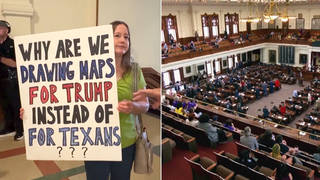
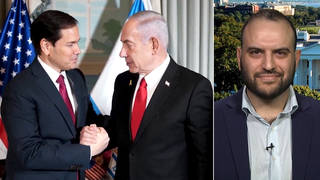
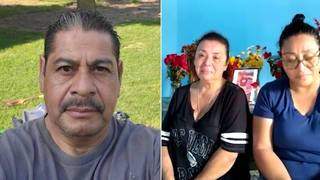
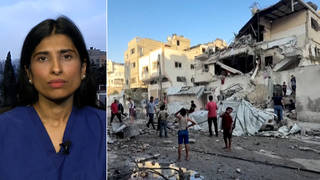





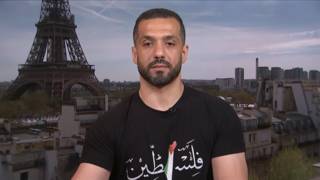
Media Options